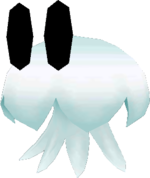Preying Mantas: Difference between revisions
From the Super Mario Wiki, the Mario encyclopedia
Jump to navigationJump to search
(The guide has it as "海月(くらげ)", not sure what to do with that.) |
Somethingone (talk | contribs) mNo edit summary |
||
| Line 3: | Line 3: | ||
|first_appearance=''[[Super Mario World 2: Yoshi's Island]]'' ([[List of games by date#1995|1995]]) | |first_appearance=''[[Super Mario World 2: Yoshi's Island]]'' ([[List of games by date#1995|1995]]) | ||
|latest_appearance=''[[Yoshi's New Island]]'' ([[List of games by date#2014|2014]]) | |latest_appearance=''[[Yoshi's New Island]]'' ([[List of games by date#2014|2014]]) | ||
| | |subject_origin=[[Jellyfish]] | ||
|comparable=[[Jellybeam]] | |||
}} | }} | ||
A '''Preying Mantas'''<ref name=NP>Miller, Kent, and Terry Munson. ''Super Mario World 2: Yoshi's Island'' Player's Guide. [[media:SMW2 Guide 128.jpg|Page 128]].</ref> is a [[jellyfish]] found underwater in ''[[Super Mario World 2: Yoshi's Island]]'' and its remake ''[[Yoshi's Island: Super Mario Advance 3]]''. Its name is a pun on {{wp|praying mantis}}, a kind of insect, and {{wp|manta ray}}, a kind of stingray. Preying Mantas move up and down in a small area, and therefore do not pose much of a threat to the [[Yoshi (species)|Yoshi]]s. The Yoshis can simply defeat them by shooting a torpedo at them in their [[Submarine Yoshi|Submarine]] forms. They appear again as enemies in ''[[Yoshi's New Island]]''. | A '''Preying Mantas'''<ref name=NP>Miller, Kent, and Terry Munson. ''Super Mario World 2: Yoshi's Island'' Player's Guide. [[media:SMW2 Guide 128.jpg|Page 128]].</ref> is a [[jellyfish]] found underwater in ''[[Super Mario World 2: Yoshi's Island]]'' and its remake ''[[Yoshi's Island: Super Mario Advance 3]]''. Its name is a pun on {{wp|praying mantis}}, a kind of insect, and {{wp|manta ray}}, a kind of stingray. Preying Mantas move up and down in a small area, and therefore do not pose much of a threat to the [[Yoshi (species)|Yoshi]]s. The Yoshis can simply defeat them by shooting a torpedo at them in their [[Submarine Yoshi|Submarine]] forms. They appear again as enemies in ''[[Yoshi's New Island]]''. | ||
Revision as of 21:14, July 30, 2023
| Preying Mantas | |||
|---|---|---|---|

| |||
| First appearance | Super Mario World 2: Yoshi's Island (1995) | ||
| Latest appearance | Yoshi's New Island (2014) | ||
| Subject origin | Jellyfish | ||
| |||
A Preying Mantas[1] is a jellyfish found underwater in Super Mario World 2: Yoshi's Island and its remake Yoshi's Island: Super Mario Advance 3. Its name is a pun on praying mantis, a kind of insect, and manta ray, a kind of stingray. Preying Mantas move up and down in a small area, and therefore do not pose much of a threat to the Yoshis. The Yoshis can simply defeat them by shooting a torpedo at them in their Submarine forms. They appear again as enemies in Yoshi's New Island.
Profiles
Super Mario World 2: Yoshi's Island
- Shogakukan guide: 水中をユラユラと浮き沈みしている。さわらなければ無害。[2] (Floats up and down in the water. Harmless if not touched.)
- Player's Guide: Moving up and down, Preying Mantas feast on Yoshi submarines. Prey on them with torpedoes.[1]
Yoshi's Island: Super Mario Advance 3
- Shogakukan guide: 水中をゆらゆらと浮きしずみしている。さわらなければ無害。[3] (Floats up and down in the water. Harmless if not touched.)
Yoshi's New Island
- Shogakukan guide: 潜水艦に変身して水中を進むときに出現する。攻擊してくることはないが、上下にゆっくりと移動する。触れるとタイムロスとなるので、避けるか魚雷で倒そう。[4] (They appear when you transform into a submarine and proceed underwater. It does not attack, but moves slowly up and down. Touching it will cause time loss, so avoid it or use torpedoes to defeat it.)
Gallery
Super Mario Game Picture Book 4: Hang in There, Yoshi
Names in other languages
| Language | Name | Meaning |
|---|---|---|
| Japanese | 海月[2][3] / くらげ[2][4] Kurage |
Jellyfish |
References
- ^ a b Miller, Kent, and Terry Munson. Super Mario World 2: Yoshi's Island Player's Guide. Page 128.
- ^ a b c 「スーパーマリオヨッシーアイランド任天堂公式ガイドブック」 (Super Mario: Yossy Island Nintendo Kōshiki Guidebook), page 7.
- ^ a b 「スーパーマリオアドバンス3任天堂公式ガイドブック」 (Super Mario Advance 3 Nintendo Kōshiki Guidebook), page 16.
- ^ a b 「ヨッシー New アイランド 任天堂公式ガイドブック」 (Yoshi's New Island Nintendo Kōshiki Guidebook), page 19.


